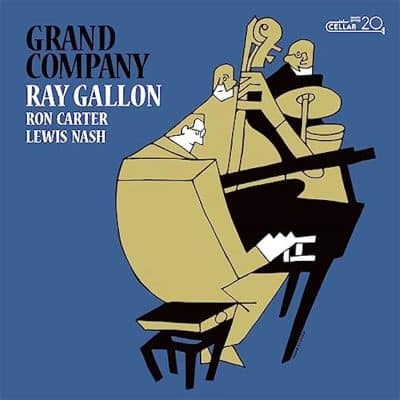Ray Gallon Grand Company
 Ray Gallon
Ray Gallon
Grand Company
Cellar Music Group
Pianist and composer Ray Gallon collaborates with the legendary bassist Ron Carter and nearly legendary drummer Lewis Nash, for this trio release, Grand Company. Gallon, previously not covered on these pages, is known for his work with such luminaries as Art Farmer, Lionel Hampton, George Adams, Wycliffe Gordon, Jon Hendricks, and Sheila Jordan. Yes, like his trio mates, he’s been doing his thing for a while. The esteemed Bill Charlap wrote the liner notes, just one small indication of Gallon’s respect among his peers. The album was recorded at iconic Van Gelder Studios and represents a “reunion” of sorts, as Gallon points to both Carter and Nash as most influential to him early in his career although this is the first time they have recorded together as a trio. So, the title has a clever double meaning – the grand piano in the studio and Gallon’s trio mates. Though a first as a trio, Gallon and Nash had the opportunity to perform together with Ron Carter in Carter’s Quintet and Nonet, so the three understand each other deeply and these nine tracks were all recorded in one or two takes, five Gallon original and his arrangements on four standards.
Ellington’s “Drop Me Off in Harlem” commences the set and features a reharmonization of the ‘A” section developed on the spot by Carter at the rehearsal and thereby included in this rendition. These cats are, of course, swinging hard as we hear solos from the pianist and bassist. Gallon’s first original is “Acting Up,” an up-tempo vibrant piece that begins with a start-stop rhythm, but it too becomes a hard swinger with Gallon’s fingers rapidly and fluidly flowing across the keys. It’s a contrafact of “Lullaby in Rhythm” filled with drastic reharmonization but the same chords. Carter’s solo toward the employs John Lewis’ “The Golden Striker” motif and is a tip of the cap to both John Lewis, Gallon’s mentor at CCNY in the late ‘70s, and Carter, who named his trio (with Donald Vega and Russell Malone) after it. The blistering pace slows for the gorgeous but moody ballad “Zombette,” another Gallon original, with the pianist’s minimal approach here in stark contrast to the two preceding pieces. His flair for and a revisit to his roots as a blues pianist reveals itself in his original “Two Track Mind,” another of Gallon’s inventive originals, harkens back to Gallon’s musical roots as a blues pianist and features an outstanding solo from Carter and a shout chorus that highlights Nash’s brushwork.
“Nardis” is the oft covered tune written by but never recorded by Miles Davis. It’s mostly associated with Bill Evans but Gallon claims to be channeling Hank Jones in this rendition with Carter’s bass figure the anchor for both Gallon’s lines and Nash’s drum solo. Gallon honors tradition and one hears practically the entire history of the jazz piano here from blues to stride, to swing, to bebop and points in between. Case in point is “Pins and Needles,” a contrafact of “Cry me a River” where he cites the influence of Red Garland as well as Lennie Tristano with Nash’s solo in the shout chorus over Carter’s bassline, a technique pioneered by Max Roach. Gallon revisits the blues again in “If I Had You,” quoting Monk along the way with his use of angular lines. Both this one and “Pins and Needles” have some tricky rhythms that are, of course, deftly navigated by this trio.
Gallon’s “Monkey Bars” is an animated piece that alternates between a 6/8 Afro-Cuban vamp and a dreamy jazz waltz. The 6/8 bassline vamp figure serves as a background for a tremendous solo from Nash, after which the tempo slows to an easy waltz-like tempo and just eases out. The standard “Old Folks” closes dating to the early ‘80s when Gallon and Carter were a duo. It’s one they played every night, constantly reinventing it as they do here, rendering it as a bossa nova with an added vamp interlude. Cleverly, Gallon added a turnaround in the final section as a nod to Carter who authored so many of these when with Miles Davis’s Second Great Quintet. So, in a bit of symmetry, Gallon closes the album with one of the first pieces he played with Carter.
Of the many laudatory words in the liners from Charlap, here’s an excerpt – “Ray Gallon’s music is informed, passionate, and personal. He possesses a unique rhythmic imagination and a wrought iron vocabulary. Grand Company is a milestone.” Piano trios don’t get any more prestigious than this in both name and execution.
- Jim Hynes
Buy Us a Cup of Coffee!
Join the movement in supporting Making a Scene, the premier independent resource for both emerging musicians and the dedicated fans who champion them.
We showcase this vibrant community that celebrates the raw talent and creative spirit driving the music industry forward. From insightful articles and in-depth interviews to exclusive content and insider tips, Making a Scene empowers artists to thrive and fans to discover their next favorite sound.
Together, let’s amplify the voices of independent musicians and forge unforgettable connections through the power of music
Make a one-time donation
Make a monthly donation
Make a yearly donation
Buy us a cup of Coffee!
Or enter a custom amount
Your contribution is appreciated.
Your contribution is appreciated.
Your contribution is appreciated.
DonateDonate monthlyDonate yearlyYou can donate directly through Paypal!
Subscribe to Our Newsletter
Discover more from Making A Scene!
Subscribe to get the latest posts sent to your email.













































